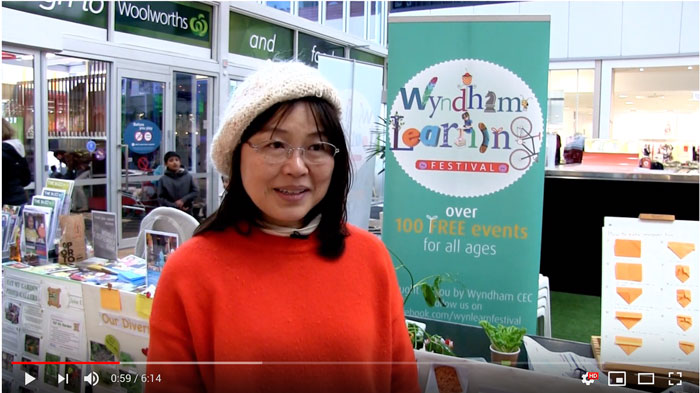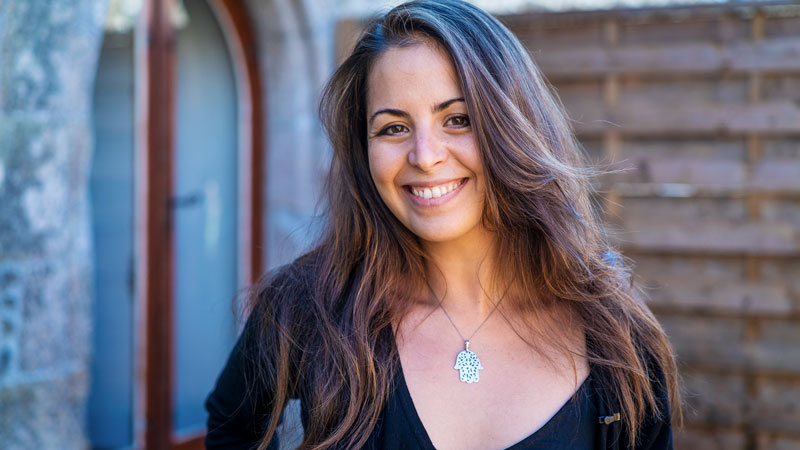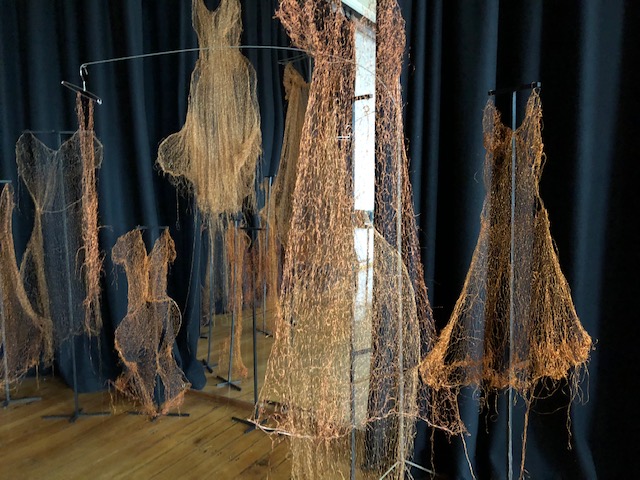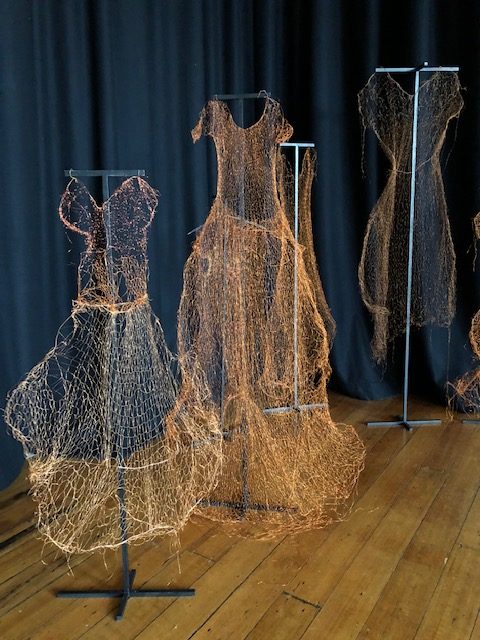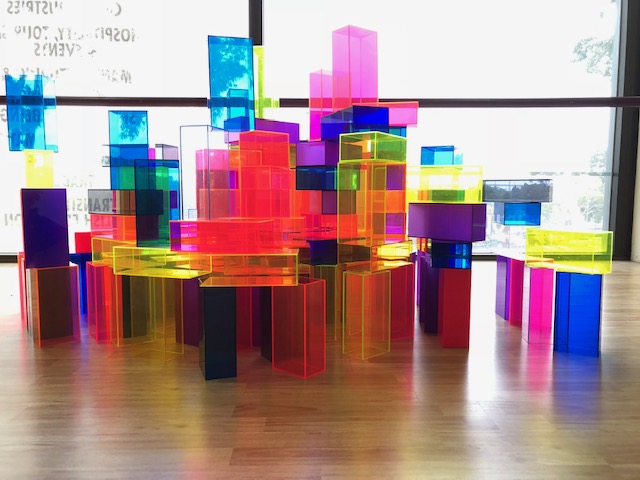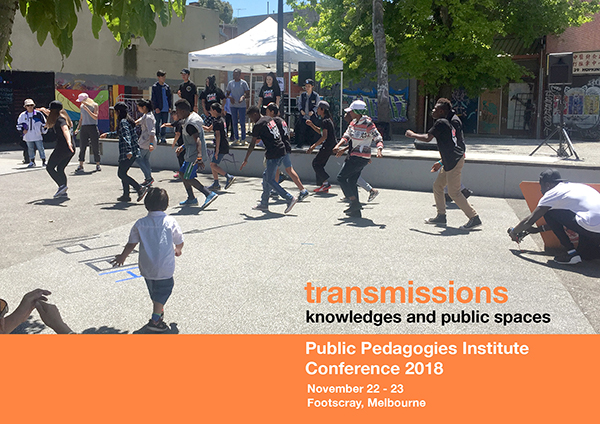The Point Cook Pop Up School event was held in September 2018 and was a day for the community to celebrate local knowledge and learning. Our video of the event captures some of the highlights.
All posts by admin
Call for Papers
The Public Pedagogies Institute warmly invites proposals for papers/workshops around the conference theme Walking and Talking Public Pedagogies. The conference will take place on the 28th and 29th of November 2019 at Victoria University, Melbourne.
This conference is interested in how thinking is disrupted and re-imagined through the act of walking. What are the possibilities that open up when we are in the realm of streets, parks, river banks or transport hubs? As we walk through our suburbs or our towns do these spaces impact on our thinking in generative ways? Do they entail pedagogical moments and how might these be defined? Together with walking this conference is also about talking. This is the International Year of Indigenous Languages. What do languages enable? For the Public Pedagogies Institute, we ask what are the affordances and constraints of Indigenous languages in public places. How does the use of these languages effect an understanding of place and the public?
We welcome and invite a range of submissions–informal presentations, academic papers, workshops, screenings–and encourage a diversity of sectors to participate in two days of ideas-sharing and networking on our theme.
Submissions of no more than 300 words will be accepted up until June 30, 2019.
All submissions should be accompanied by a 100 word biographical note. Please send to karen.charman@vu.edu.au
Keynote Speakers:
We are excited to announce our first keynote speaker
Stephanie Springgay is an Associate Professor in the Department of Curriculum, Teaching, and Learning at the University of Toronto. She is a leading scholar in research-creation methodologies with a focus on walking, affect, new materialism and posthumanism, queer theory, and contemporary art as pedagogy. Her most recent research-creation projects are documented at www.thepedagogicalimpulse.com, www.walkinglab.org and www.stephaniespringgay.com. She has published widely in academic journals and is the co-author of the book Walking Methodologies in More-than-Human World: Walkinglab Routledge (2018), with Sarah E. Truman; co-editor of M/othering a Bodied Curriculum: Emplacement, Desire, Affect, University of Toronto Press, with Debra Freedman; co-editor of Curriculum and the Cultural Body, Peter Lang with Debra Freedman; and author of Body Knowledge and Curriculum: Pedagogies of Touch in Youth and Visual Culture, Peter Lang.
We are pleased to announce our second keynote speaker for this year’s Public Pedagogies Conference—author Tony Birch.
In 2015, Dr Tony Birch joined VU as the first recipient of the University’s Dr Bruce McGuinness Indigenous Research Fellowship. Dr Birch is a renowned academic, author, educator and researcher. His research interests centre on climate change and indigenous knowledge systems. Dr Birch’s books includeShadowboxing (2006), Father’s Day (2009), Blood (2011), The Promise (2014) and Ghost River (2015). In 2017 he was awarded the Patrick White Literary Award for his contribution to contemporary Australian literature.
The ethics and politics of research-creation with diverse publics
Presenter: Stephanie Springgay, University of Toronto
Thu., 14 March 2019
5:30 pm – 7:00 pm
Melbourne Graduate School of Education
Feminist scholars argue that we need research practices that break with ableist, racist, extractive, and settler colonial logics, and instead focus on ones that are situated, relational, and accountable. As such researchers are urgently turning to new ways of doing research and taking action, including research-creation practices that are responsive to the needs of communities and stewardship. This talk will emphasize the importance of queer feminist, anti-racist, and anti-colonial frameworks influenced by feminist new materialisms, affect theory, and queer theory. To contextualize these situated ways of doing research a number of exemplifications with diverse publics will be shared.
Stephanie Springgay is an Associate Professor at the University of Toronto. She is a leading scholar of research-creation with a focus on walking, affect, queer theory, and contemporary art as pedagogy. Her SSHRC-funded research-creation projects include: WalkingLab (www.walkinglab.org) and The Pedagogical Impulse (www.thepedagogicalimpulse.com). She has published widely on contemporary art, curriculum studies, and qualitative research methodologies www.stephaniespringgay.com
To find out more about this event and book tickets please go to:
2018 in review
A note from the President:
Hi Everyone,
This is just a brief note to wind up our work this year at the Public Pedagogies Institute. We have had some really interesting events and projects in development over the past twelve months.
We began the year thinking through ideas of how to re-structure the Institute. We have moved more formally into sub groups that consist of the Pop Up School and Knowledge Project, Research, Conference Organisation and the Journal. All of these sub-groups are open to anyone who wants to get involved. We had some discussion about whether we would stick to the monthly general meeting structure or just have reports from sub groups. Most people felt a strong connection to the monthly general meetings so these will continue.
Like all volunteer organisations, people contribute what they can. Having said that we are keen for people to pick up on work within one of the sub-groups as this helps the whole of PPI tick over.
We had a great one day symposium this year co-hosted by PPI, The City of Greater Geelong and Deakin University. The work that is being undertaken in Geelong is fascinating. The City of Greater Geelong has as its motto ‘A clever and creative future: it’s in our hands’. This self- determining emphasis is in line with our Institute. We look forward to a stronger presence there next year working alongside people who are contributing to the learning and teaching that takes place in community.
Once again, we partnered with the City of Wyndham with a Pop Up School and Knowledge Project in Point Cook. Despite the weather–it actually rained–the day was very successful. Point Cook is a vibrant community. We have only undertaken a few interviews there but I can say one theme that emerges strongly is of a future focused community. We look forward to interviewing more people to broaden our understanding of the depth of knowledge that is Point Cook. Thank you to the people who came and helped out at the Pop Up School day this year.
We have almost completed our next curriculum iteration, Toward a Werribee Curriculum that we will launch in February next year. We will keep you posted on the actual date and place.
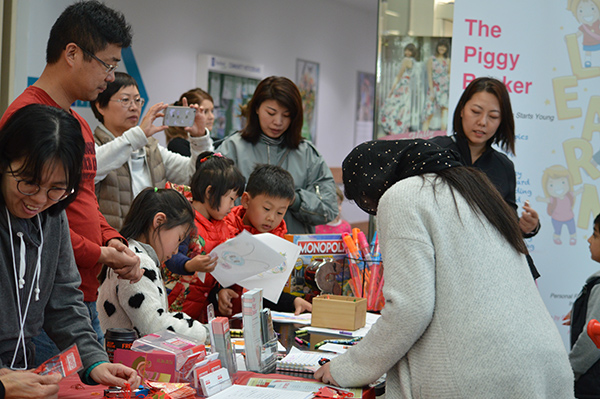
This year we had another fantastic conference, Transmissions: Knowledges and Public Spaces. Our two keynote speakers Jake Burdick from Purdue University and artist Charlotte Courtois, were really engaging. We thank them for making the effort to fly to the other side of the world!
I was also pleased to announce at the conference the inaugural recipient of the ‘Life Time Achievement Award in Public Pedagogy’, Professor Maureen Ryan. We acknowledge Maureen’s ongoing contribution to the field.
The conference attracted an eclectic mix of people and featured a diverse range of presentations and workshops. We thank everyone for their contributions.
This year we partnered with the VU Polytechnic Event Management and Hospitality students who assisted us in running the event. This partnership is in keeping with the Institute’s openness to knowledge contributions from the broadest possible spaces.
I would like to thank Victoria University, Institute for Sustainable Industries & Liveable Cities for making funding available to support the conference.
The Conference also saw the launch of the third edition of the Journal of Public Pedagogies. You can read this year’s edition on our website. The Journal is also co-hosted by the library at Victoria University and we thank them for their support (See https://jpp.vu.edu.au/index.php/jpp).
Next year the Journal will be a special edition on walking methodologies edited by Stephanie Springgay, who will also be the keynote speaker at our 2019 conference, and Sarah E Truman.
Thanks for all of your support this year. I look forward to seeing you next year as we move the work of the Institute forward.
Dr Karen Charman
President Public Pedagogies Institute
Conference Dates 2019
The dates for next year’s conference will be November 28 – 29.
Please contact us if you have any proposals for workshops or presentations.
PACT: Portable Art Connections Toolkit
Portable Art Connections Toolkit (PACT) is a kit for creating a collective experience of making stories and artwork about the things that matter to you and your community.
PACT provides tools for building creative agency and ethical storytelling, wrapped up in a hi-vis kitbag. It packages a starter set of props with a detailed user manual, prompting people to work together to make and share stories about things that are important to them. You can follow the workshop plan from the manual, or adapt it to use whatever elements are useful to your group and situation.
The user manual includes introductory information and a sequence of four workshops. There is an overview page for each of the four sessions, which expands out into a set of activities and discussion prompts to help activate the kit and facilitate the group’s collective experience. Each PACT artkit comes with six print copies of the user manual included and is suitable for use suits use with up to five participants, plus a facilitator. If you plan on working with a larger group, add more kits.
PACT aims to make visible how the practice of creativity is an enabler of personal, social, and collective agency. It was designed for young people aged 12 – 21 who have an interest in art or creative production of any kind, but you can use it with older or younger people too.
We’re giving away 200 artkits free of charge (including postage within Australia), so pop over to our website to find out more & request a kit! We’re hoping people will also use the website as a space to share images or blog about things they’ve done using the kit.
Vist us: www.pactup.org
Request the PACT artkit or start a conversation using the contact form on our About page.
Intangible cultural heritage and intercultural dialogue
The role of public pedagogies in transmitting intangible cultural heritage and promoting intercultural dialogue
Charlotte Courtois
As American ethnomusicologist Alan Lomax warned, “if we continue to allow the erosion of our cultural forms, soon there will be no place to visit and no place to truly call home”. In this talk, Charlotte Courtois will discuss the role of public pedagogies in transmitting intangible cultural heritage as well as in promoting intercultural dialogue. Charlotte has been experimenting for 8 years, crafting workshops for children all around the world in order to develop their curiosity both about other cultures and about their own heritage. She will share the tools she uses and explain how the work of her association Konstelacio manages to put children in a position where they realize that they too – and not only adults – have cultural knowledge to share.
This presentation will take place on:
Friday November 23, 2018, 10.00am, Room T226
This session is part of:
Public Pedagogies Institute Conference 2018
November 22-23
Footscray, Melbourne
Exhibition and Activation
The Public and Touch
Victoria University, Nicholson Street Campus
Theatre Space, N222
November 22-23, 2018
Red Earth Dresses:
An exhibition around Touch, Place and Identity
Shelley Hannigan with associate dress creators
Beatrix Rowe, Jane Bartier, Monica Moore,
Jo-Anne Britt, Amanda Rea and Karlee Blackburn
Knitting, twisting and knot-making with copper wire and thread, are some of the ways I have created this exhibition piece titled Red Earth Dresses. I create my art whilst entangled in a place I have co-constructed through experiences such as: being here, there, imagining, memory, creating, observing, listening, touching and feeling. In the process of creating Red Earth Dresses, I have handled materials, felt strains in my arms and hands from knitting six life size dresses and a range of miniature versions and twisted, knotted and woven copper wire into them. These images have emerged from a process of ‘free knitting’ where no pattern is used. I have responded to the emerging form, stretching the weave out to see and feel what is coming.
Dresses have emerged in my work for over forty years. In past works, dresses have represented my identity as a migrant moving over, in and through landscapes, embodying my past, but never laying claim to place. In Red Earth Dresses I share this experience and work around touch, place and identity as this work has come to represent my own and other women’s experiences and relationships with the earth/land of Australia. I have come to identify with these women as a regional Australian citizen for twenty years. It is my experience and in-sight that women of the past and of this land have adopted some of the colonial Victorian dress sensibility and aesthetics but also blended and connected with the earth through their place experiences. Their dresses were worn and torn and mended in parts. These traces of touch through wear, tear and mending are materials memories of place and bodily engagements on this land that I have captured and present in this work. (Shelley Hannigan)
Tread – Softly
Merinda Kelly and Soraya Mobayad
(Exhibition and activation)
Open to the possibilities of materiality, time, space and place, a series of objects and structures will be situated as provocations to prompt unfolding possibilities for playful encounter, social connection, experimental engagement or performative action. Experimental pedagogies will also be activated to catalyse individual and collaborative responses to the spatial intervention as it emerges over time.
Merinda Kelly’s current modes of practice are experimental, socially engaged and collaborative. Interventions, installations and experimental pedagogical encounters are positioned across specific sites, time frames and publics to entice public engagement, dialogue and collaboration. She has also worked extensively over the past six years with creative practitioners, researchers, and educators in the Geelong region to explore transitions and tensions emerging in response to staged processes of deindustrialisation.
Since undertaking a Bachelor’s degree in Visual Art, Soraya Mobayad’s artistic practice has extended to explore deindustrialisation, audio frequencies and the relationship of noise to information. Her work takes the form of drawings, public works, installations, bespoke electronic circuits and audio loops. Mobayad is currently undertaking a Masters of Teaching at Deakin University. She was previously Creative Program Coordinator at Courthouse Youth Arts, was selected for the Footscray Community Arts Centre Emerging Cultural Leaders Program in 2017, and currently works on arts projects involving the community and socially engaged practices.
This session is part of:
Public Pedagogies Institute Conference 2018
November 22-23
Footscray, Melbourne
Communities, Creativity and Public Pedagogies
Public Pedagogies Institute Conference 2018
Footscray, Melbourne
Friday November 23, 1.30pm – 3.00pm
Priming and Vibing Everyday Life: Tracking the Public Pedagogies of Footpath Gardens
Jesse Hsu
Abstract:
The notion that everyday spaces enable informal learning is a central theme within public pedagogy scholarship. How learning actually occurs in various sites is either theorized from the perspective of an individual’s immersive and aesthetic encounter (Ellsworth, 2005) or simply left unsaid—with pedagogy effectively seen as a ‘deus ex machina’ or a ‘black box’ that inexplicably catalyzes learning (Watkins et al, 2015). This presentation articulates an approach to understanding the public pedagogy of spaces as an ongoing interplay between a given site’s representation and social practices. Through a blend of visual and ethnographic data, this approach is demonstrated to the case of a single verge garden in the neighborhood of Glebe in Sydney. This research draws attention to the link between a space’s design and its pedagogy. In the case of edible verge gardens, attentive design increases the degree of ‘pedagogic agency’ a site has in affecting social change at an everyday level.
PACT: Portable Art Connections Toolkit
Nina Lewis
Abstract:
This session introduces the Portable Art Connections Toolkit as an apparatus for supporting communities in making art together and having creative agency over how the stories, information and practices that matter to them are shared.
Portable Art Connections Toolkit – PACT – is a kitbag containing props and prompts for creating a collective experience of making stories and artwork. It equips communities/users to shape narratives about the things that matter to them and to situate those messages as part of the cultural landscape.
PACT is like an ikea of arts participation: functional, hackable, purposeful, accessible.
PACT comes with a user manual describing one method for activating the kit. Guided to exercise choice, adaptability and negotiation in how they share what matters to them, participants gain agency over their creativity while learning to collaborate with others.
PACT’s point of difference is to both strengthen and see beyond personal narrative, positioning individual creativity on a pathway to collective and community-led process.
This is valuable for individual and social wellbeing. Because participants are encouraged to care about shared context (not just personal stories), they perceive themselves as connected into wider environments. Recognising shared stories as a way of being strong in community helps negotiate trust and respect, promotes social inclusion, and motivates people to work with others to create and sustain shared cultural narratives.
Session attendees will learn more about the method and theory of change underpinning the PACT artkit and the group will test out some of the props and prompts together. Following the session, attendees can request free PACT toolkits to use within their own communities.
This session is part of:
Public Pedagogies Institute Conference 2018
November 22-23
Footscray, Melbourne
Maker Spaces – Pedagogical Potential and Pitfalls
Public Pedagogies Institute Conference 2018
Footscray, Melbourne
Maker Spaces – Pedagogical Potential and Pitfalls
Friday, November 23, 1.30pm – 3.00pm
Maker Spaces are ripe with potential to redress pedagogical practices in the 21st Century within and outside of formal institutions. Researchers and educators share there thoughts, research and observations.
The presenters:
Greg Giannis, artist, researcher and educator.
Maker Spaces: Creativity, Civic Engagement and Critical Making
Garnet Hertz, Emily Carr University of Art and Design (remotely)
Critical Making
David Hyatt, School of Education, University of Sheffield.
The EU MaKEY project
Rebecca Wells, Leading Teacher,
Canterbury Primary School Maker Space
This session is part of:
Public Pedagogies Institute Conference 2018
November 22-23
Footscray, Melbourne
Register for the conference here
Read the related article:
Art & Technology: a Maker Space Experiment for Children
by Greg Giannis
Conference Program and Abstracts
Public Pedagogies Institute Conference 2018
November 22-23
Footscray, Melbourne
View and download the conference program
View and download the conference abstracts
What forms does learning and teaching take outside of formal institutions?
The annual conference of the Public Pedagogies Institute features presentations, performances and workshops across the diverse field of public pedagogies and is open to participants from many sectors.
What are Public Pedagogies?
We understand public pedagogies to incorporate the many sites in which teaching and learning occurs in the community or outside formal institutions. These may include museums, libraries, neighbourhood houses, community centres, public spaces, as well as through the arts, community engagement, media and beyond.
Topics of focus this year include: Maker Spaces, Activist Art, Creative Body Based Learning, The Public and Touch, Visual Thinking Strategies, Contemporary Social Movements, Community Art Practices and more.
Public Pedagogies Institute Conference 2018
November 22-23
Footscray, Melbourne
Register for the conference here
Register for the conference dinner here
View and download the conference abstracts

